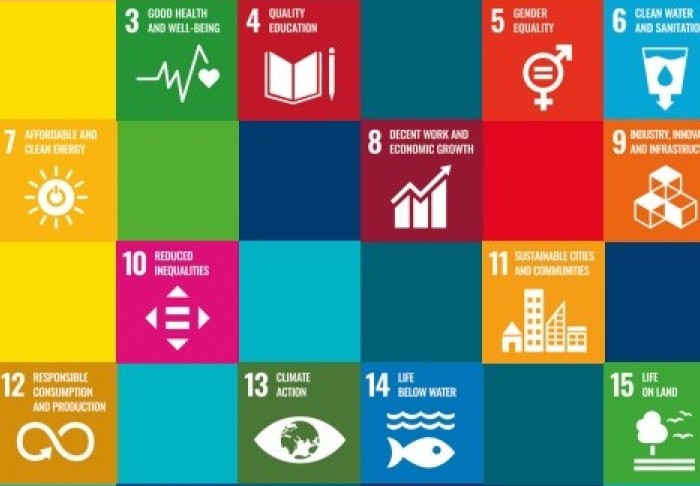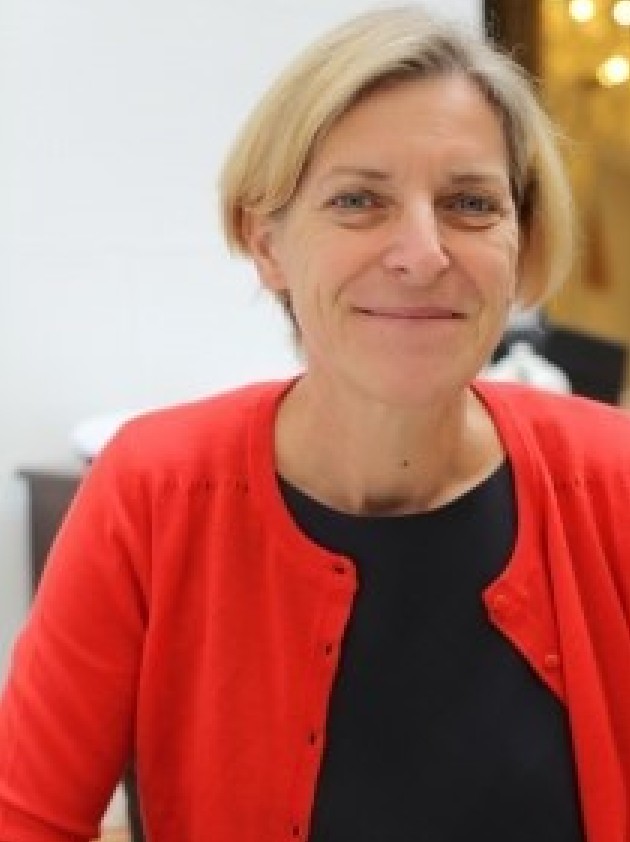Imperial's Global Development Hub to maximise impact of research on society

The Global Development Hub is to play a key role in maximising the impact of the College's research in society and the developing world.
The Hub has been added as one of the College's seven Academic Strategy Projects to bring together Imperial's community to tackle some of the world's most pressing challenges.
The Hub will accelerate the global impact of Imperial's world-leading research, education and innovation, engage with the United Nations Sustainable Agenda 2030, and work with some of the most vulnerable and marginalised in societies where multiple global challenges are acutely concentrated.
A new report detailing Imperial's diverse contributions to the United Nations Sustainable Development Goals (SDGs) has been released.
Imperial's Provost, Professor Ian Walmsley said: "Pursuing world-leading research and education for the benefit of society has always been at the heart of Imperial’s mission.
"The Global Development Hub will help Imperial’s research have a lasting impact on planning for the challenges of sustainable development that the world will be facing over the next century.
"The Hub will focus on some of the most pressing needs of our societies including climate change and pollution, global epidemics such as COVID-19 and Malaria, world hunger and access to clean water.
“As a key investment in our Academic Strategy, the Hub will enable us to realise our ambition to deliver transformative impact on a global scale."
Working with global partners
Spanning the College's work across research, education and innovation, the report examines the range of ways that Imperial is working with partners across the world to co-create solutions to intractable international development issues. It aims to identify practicable pathways to healthier and safer lives, sustainable development and social progress.
"We have much to learn from our global partners and friends and so I welcome the opportunity to collaborate with new partners on this pathway.” Professor Maggie Dallman Vice President (International)
Vice President (International) Professor Maggie Dallman, said: "Institutions like Imperial have a vital role to play in addressing the UN’s 2030 Sustainable Development Goals and the challenges that lie beyond them.
"Sustainable global development requires a holistic, systems approach that can only be achieved through equitable and innovative partnerships that engage and convene a diverse range of actors, including those who are most vulnerable to global challenges.
"The College’s Global Development Hub will draw on Imperial’s excellent convening power, systems approach and multidisciplinary expertise to build new communities of practice across sectors and disciplines and provide a vital connection point for building partnerships. We have much to learn from our global partners and friends and so I welcome the opportunity to collaborate with new partners on this pathway.”
Launched in April of last year, the Global Development Hub harnesses Imperial academics' expertise to engage with the UN's SDGs and works with some of the most vulnerable and marginalised in societies where global challenges are acutely concentrated.
The Hub will be led by Professor Michael Templeton, from the Faculty of Engineering and Professor Sarah Fidler from the Faculty of Medicine.
UN Sustainable Development Goals
The United Nations' 17 SDGs provide a framework for tackling an urgent set of global challenges, and endeavour to achieve a sustainable future for humanity and the natural world, such as ending hunger and poverty, providing clean water and sanitation and ensuring responsible consumption and production.
The SDGs provide a focal point for universities, industry, third sector and government partners working across disciplines to collaborate, to develop and deliver innovative and appropriate solutions to these shared global challenges.
Global Development Hub
At a time when science, technology and medicine are at the forefront of government agendas across the globe, the Global Development Hub strengthens Imperial's position as a thought-leader in the development sphere.
"These challenges cannot be solved by any single discipline, nor by UK-based researchers on their own." Professor Mike Templeton Co-Chair of the Global Development Hub
It serves to amplify and complement other College forums, strategic initiatives and networks that bring together government, academia and industry to tackle global sustainable development challenges. Given that the SDGs are interconnected, addressing them requires this kind of truly collaborative approach.
The Global Development Hub's SDG of the Month series aims to explore the work from Imperial's staff, students, alumni and global partners that is aligned with the UN's Sustainable Development Goals.
These events create opportunities to explore new innovative partnerships that move away from traditional academic partners to work with in-country practitioners that have in-depth knowledge of the issues in their communities.
"The Hub will support medics, engineers and scientists to shape and aid the development of ambitious multi-disciplinary research projects." Professor Sarah Fidler Co-Chair of the Global Development Hub
The Hub has also brokered new institutional and faculty links, both to networks of academic partners working on development challenges such as African Research Universities Alliance (ARUA) Centres of Excellence, and UN and other multilateral agencies, for example, through structured engagement with the network of 90 UNDP Accelerator Labs across the world.
The UNDP labs are focused on working with policymakers and innovators in developing countries to forge solutions to local challenges in order to achieve the Sustainable Development Goals (SDGs) by 2030.
Hub Co-Chair from the Faculty of Engineering, Professor Michael Templeton, says, "We are incredibly excited that this interdisciplinary Hub connects all Faculties, Institutes and facets of Imperial towards the common goal of international sustainable development. It will allow us to attack international development challenges from different important angles, bringing Imperial's wide-ranging, complementary interdisciplinary expertise together with international partners in order to devise more holistic and ultimately more effective solutions. These challenges cannot be solved by any single discipline, nor by UK-based researchers on their own."
Hub Co-Chair from the Faculty of Medicine, Professor Sarah Fidler, says, "The Hub offers a flagship institutional initiative to develop, amplify and support research impact in Lower Middle Income Countries (LMICs). It will support medics, engineers and scientists to shape and aid the development of ambitious multi-disciplinary research projects."
As Amina Mohamed, Deputy Secretary General of the UN and Chair of the UN SDG, said at the launch event, "The Hub speaks to the need to conduct multidisciplinary research, capacity building, peer-learning and knowledge exchange that brings together institutions and partners across the world, that can help us move decisively towards sustainability and equity."
Co-developing solutions with in-country partners
A primary way in which the Hub engages with the SDGs is by supporting partnerships to co-develop solutions with in-country research partners and stakeholders.
Partnering with six major cities around the world, Imperial leads a project using interdisciplinary methods and big data to help cities and urban centres become 'inclusive, safe, resilient and sustainable'.
More than half of the world population now lives in cities, with mega-cities such as Beijing and Dhaka home to more than 10 million people each.
In 2018, a major new research partnership was launched to explore ways of reducing health inequalities in cities around the world. Led by Imperial and funded by the Wellcome Trust, 'Pathways to Equitable Healthy Cities' focuses on co-production of rigorous evidence with partners in London, Vancouver, Tamale, Accra, Dhaka and Beijing.
Professor Majid Ezzati, who co-leads the project, says: "People have always lived in cities in order to have better opportunities for health and wellbeing. However, cities in both poor and rich countries are also a setting for inequalities that are fundamental barriers to sustainable human development. What we need are plans and policies that leverage cities' potential for innovation to improve the health of low-income and marginalised groups."
The project uses interdisciplinary methods from social sciences, engineering, environmental science, epidemiology and big data to evaluate how policies and programmes can improve public health in urban regions.
Fighting inequalities
The Hub also works to combat inequalities in societies where multiple global challenges are acutely concentrated.
For example, over the past 20 years, Professor Kathryn Maitland and her team have pioneered new research into treating children with severe malaria, anaemia, sepsis and malnutrition in sub-Saharan Africa - conducting some of the largest clinical trials in the continent that have helped drive down child mortality. 
Her team conducted the largest trial in critically ill children ever undertaken in Africa, examining fluid resuscitation strategies in children with severe illness. The trial won the prestigious BMJ Research Paper of the Year award and influenced changes to World Health Organization management guidelines.
"The focus of my research is the critically ill child at the point of hospital admission, and emergency treatments required to bridge the gap until the medications start to work," says Professor Maitland. "Our research is readily translatable, because we design the large clinical trials for the settings in which the actual guidelines will be adopted."
Students at the fore
One of the Hub's key aims is to instil in students a passion for international sustainable development, and foster the type of thinking needed to confront the SDGs and effect their lasting legacy.
Since its inception in 2012, the Change Makers Programme has given all of Imperial's students the opportunity to become Change Makers. Cross-departmental teams of students are tasked with using their skills to design broad, innovative and inclusive solutions for global challenges.
In the first-year Change Makers module, students are introduced to the SDGs by critiquing the framework through the lenses of strategy, measurement and innovation. Following that, the modules are directed towards teams of students designing feasible solutions for real-world sustainable development challenges. This builds upon the students' knowledge of the SDGs, with projects focusing on the inclusion of women in development (SDG 5), smart cities (SDG 11), and health and wellbeing (SDG 3). Postgraduate students are also offered the opportunity to experience Change Makers.
Course director Dr Elizabeth Hauke is keen to emphasise the real-world impact that every person has the power to make. She states: "The first steps are for the students to build their own understandings of the issues facing humanity, alongside exploring the SDG framework. Students need to feel that the SDGs capture and frame issues that they care deeply about and empower them to create and live change in their own communities and beyond."
For further information about the Global Development Hub, the case studies referenced, or to get in touch, see the website.
Article text (excluding photos or graphics) © Imperial College London.
Photos and graphics subject to third party copyright used with permission or © Imperial College London.
Reporter
Nicola Samosa
Strategic Programmes & Change
Stephen Johns
Communications Division
